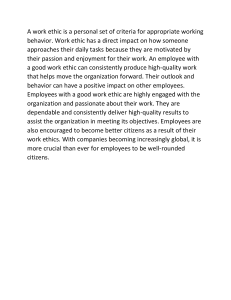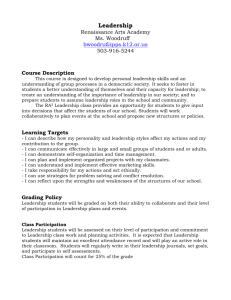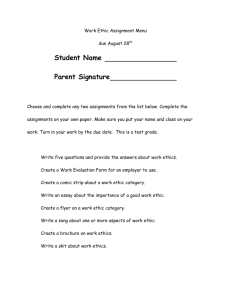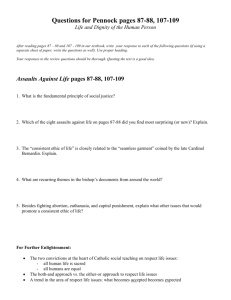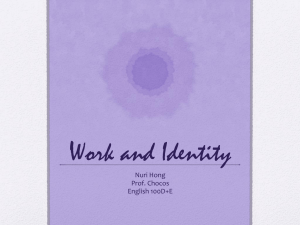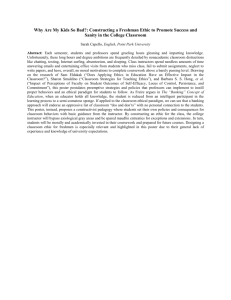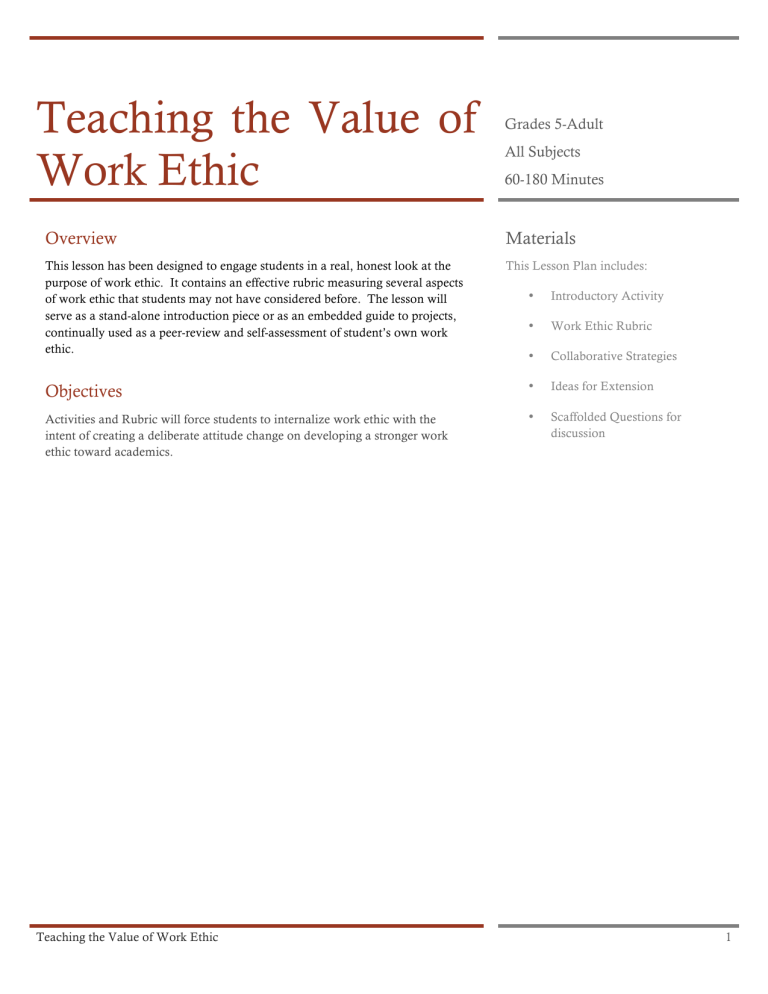
Teaching the Value of Work Ethic Grades 5-Adult All Subjects 60-180 Minutes Overview Materials This lesson has been designed to engage students in a real, honest look at the purpose of work ethic. It contains an effective rubric measuring several aspects of work ethic that students may not have considered before. The lesson will serve as a stand-alone introduction piece or as an embedded guide to projects, continually used as a peer-review and self-assessment of student’s own work ethic. This Lesson Plan includes: • Introductory Activity • Work Ethic Rubric • Collaborative Strategies Objectives • Ideas for Extension Activities and Rubric will force students to internalize work ethic with the intent of creating a deliberate attitude change on developing a stronger work ethic toward academics. • Scaffolded Questions for discussion Teaching the Value of Work Ethic 1 Activities The instructional design I follow with this lesson is more exploratory in nature. I do not announce that we will be now studying work ethic. I allow it to unfold to perk their curiosity in the topic. 1. 2. 3. 4. 5. 6. Start with “12 Who Mattered” Activity. I tell them that this is a 2-part activity. The first is a 3-minute timed part. “When I say go, turn the sheet over, read the directions and stop when I say “time”.” Following the 3-minute time, I then say, “I want you to take your sheet, and complete the bottom 6 boxes with names from your peers in the room. Walk around, see who others came up with to represent effort = achievement and write in the 6 names you like best. At this point, you can spend as much time as you like identifying and discussing the people as case studies. I write the formula on the whiteboard “effort=achievement” and ask students for other terms that we use besides effort. When someone responds with work ethic, I write this below the formula on the board too. If you want to spend more time here, you could have groups of 3-4 students create a couple of graphic organizers on their people. Pass out the copy of the Work Ethic Rubric and read through it with the class. Use the Scaffolded Questions for Discussion to guide your students with this sheet. “Next Steps” will be determined by you as the instructor. You can use this as a mentoring, assessment aid with students using to self-assess. You can use it during collaborative projects to have students engage in a peer-review to use with assessment phase. You can put aside and use it as a referral piece when you discuss work ethic or lack of. Adaptations 1. The file contains a pdf version and a document version of the work ethic rubric. Several teachers have found, given their grade level and student demographic, the need to vary the categories and/or descriptions. Teaching the Value of Work Ethic 2 Twelve Who Mattered Directions: There are 12 boxes below. You have exactly 3 minutes to fill in the first 6 boxes with the name of a person whose life demonstrates: EFFORT = ACHIEVEMENT The names can be anyone you know personally or have read about, living or dead. You just need to be able to justify to the rest of us that they meet our effort = achievement criteria. Only fill in the top 6 boxes…GO! Teaching the Value of Work Ethic 3 Scaffolded Questions for Work Ethic Rubric Teacher’s Guide: Scaffolding your questions to students allows them to build on their understanding and synthesis of the topics as you ask questions at different cognitive levels. 1. 2. 3. 4. 5. 6. 7. Who are the two people you heard mentioned in our “Twelve That Mattered” that you think really exemplify the best work ethic? (knowledge) What did you use as your criteria to judge the people you included? (understanding) In your own life, what are some behaviors you use to demonstrate your work ethic? (application) Which 2-3 characteristics do you think best illustrate someone has a good work ethic? (analysis) Let’s take 5 specific people and list on the white board. From our knowledge of these people and their achievements, what 2-3 key traits do you think they have in common? (synthesis) Read through the rubric, which columns surprise you that they are included in an evaluation of “work ethic”? (evaluation) If you had to add a column to the work ethic criteria, what is a trait that our rubric could be improved by? (creation) I like to have the students circle the sections to assess themselves in each category. You can use it as a discussion tool, a growth tool to revisit throughout the year, or as a peer assessment tool for projects. Teaching the Value of Work Ethic 4 WORK ETHIC EVALUATION WORK ETHIC EXCELLENT ACCEPTABLE UNACCEPTABLE Hands in work on time in high quality form. Hands in work on time but had to rush to finish & the work quality has Work not handed in on time. CRITERIA DEADLINES suffered. Listens and reads directions; able to work without supervision; works the entire time Works on assigned projects, but must ask for extra instructions or concentration level varies Must be told to get back to work or to begin working; distracts others. Has proper materials every day; ready to participate in each day’s activities. Has proper materials but must scramble at times to get them; ready to participate Borrowing or searching for material; not ready to participate. Works toward achievement of group goals; promotes group interaction. Works toward group goals and expresses ideas with prompting. Does not work toward group goals; does not participate in group interaction. COMMUNICATION Listens and participates; follows written and oral directions; speaks and writes effectively 100% of the time. Listens and participates; follows written and oral directions; speaks and writes effectively with some prompting. Does not listen and/or participate; does not follow directions, does not express spoken or written language clearly. Generally uses good manners and show concern for others. Seldom uses good manners or shows concern for others. RESPECTFULNESS Frequently uses good manners and shows concern for others. PRODUCTIVITY PREPAREDNESS TEAMWORK Teaching the Value of Work Ethic 5
